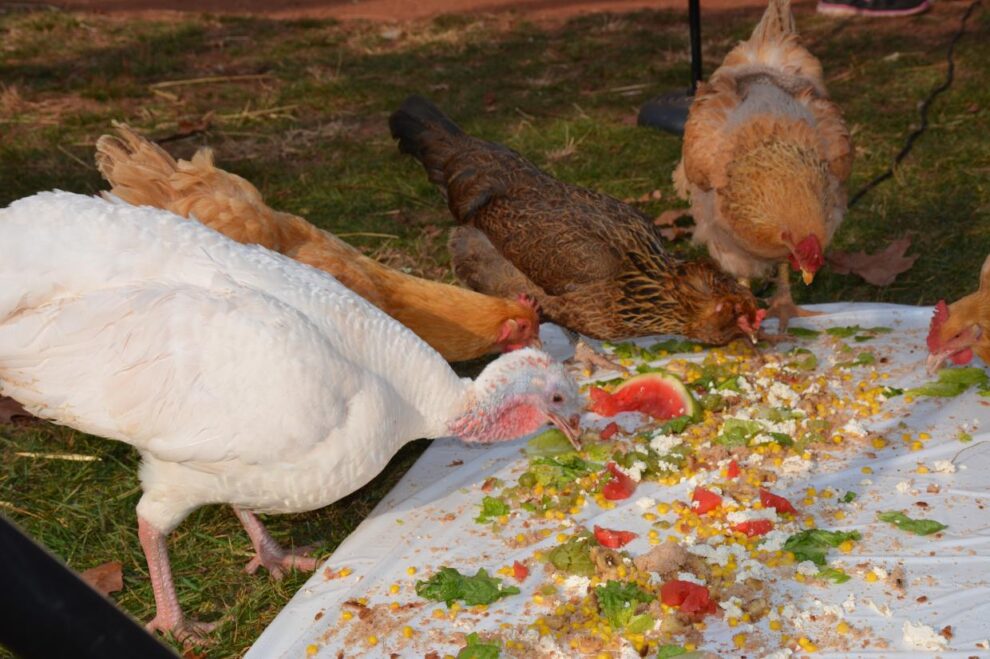Thanksgiving is a time to loosen your belt and feast on a big ol’ bird.
But more people are choosing plant-based options these days, with a lower carbon footprint, says an animal welfare group called Mercy for Animals, citing government statistics.
Oh, but you’ve seen plant-based turkeys before. They look like a football. They can’t compare to a traditional turkey. They’re not very appetizing.
But not everyone feels that way. “I would argue that seeing a dead animal on the table is not very appetizing,” counters AJ Albrecht, managing director for Mercy for Animals in the United States and Canada.
Albrecht isn’t here to criticize traditional holiday meals. But her group says plant-based options made from various sources of protein like soy are getting easier to find as their popularity grows. If you want to get on the bandwagon, the group even has a cookbook at ChooseVeg.com that’s been updated in time for (plant-based) Turkey Day.
Mercy for Animals calls it a guide to “eating sustainably and compassionately.” As the group’s name suggests, the nonprofit has plenty to say about the way animal turkeys are treated before they make it to dinner tables. Talk about unappetizing.
As for the guide: “You get access to lots of recipes, tips for how to get started,” Albrecht says. “It’s a free guide. It’s really meeting people where they’re at.”
That is, you don’t have to give up meat and shame meat eaters at the Thanksgiving dinner table. “It’s pointing to options that we think are accessible to folks who maybe haven’t eaten this way before,” Albrecht says.
Forbes Daily: Get our best stories, exclusive reporting and essential analysis of the day’s news in your inbox every weekday.Sign Up
By signing up, you accept and agree to our Terms of Service (including the class action waiver and arbitration provisions), and you acknowledge our Privacy Statement.
Going plant-based for Thanksgiving can be simple and tasty, the group argues. And more people are trying it as a more healthy, sustainable and humane way of celebrating holidays (and for daily meals).
As for those statistics: Per capita turkey consumption has declined for more than 25 years, from 17.7 pounds in 1995 to 14.6 pounds in 2022, according to the U.S. Department of Agriculture.
In July 2023, national turkey production was 7.4% below the 2018–2023 average.
Meanwhile, plant-based meat dollar sales increased by 43% from 2019 to 2022, according to the most-recent Good Food Institute industry report. And plant-based foods outpaced animal-based foods in dollar and unit sales growth from 2019 to 2021.
“We’re seeing that more and more folks are choosing to leave turkeys off of their plates, which from our perspective is very exciting,” says Walter Sanchez-Suarez, animal behavior and welfare scientist at Mercy for Animals.
Of course, turkey is still the most popular food for Thanksgiving in the United States. And there are tons of other cookbooks and holiday meal guides out there.But they likely don’t include stats for turkey-related greenhouse gas emissions. Sanchez-Saurez says he hasn’t found a perfect comparison, but a Canadian study suggests that an animal turkey has a carbon footprint that’s about four times that of a plant-based turkey.
Plant-based turkey is even being advertised alongside traditional birds at places like Meijer, with hundreds of grocery supercenters throughout the Midwest. The retailer anticipates selling 1 million turkeys this holiday season and 7,000 pounds of soy-based tofu turkeys during week of Thanksgiving.
Source : Forbes










